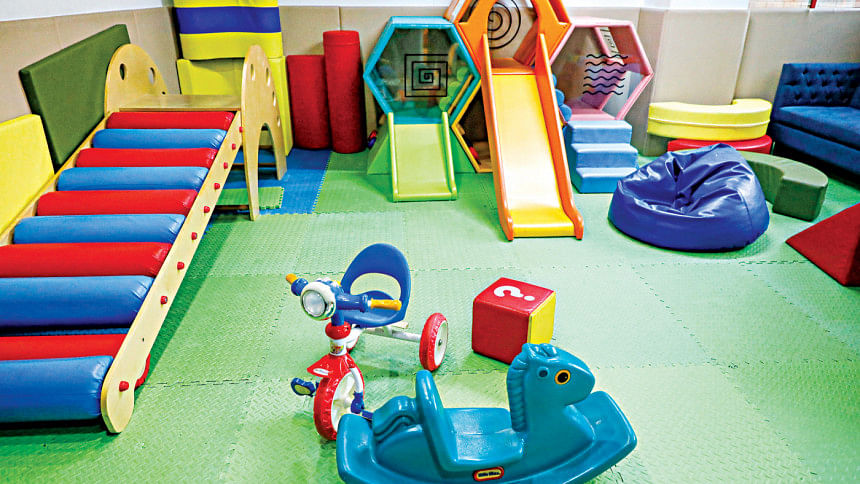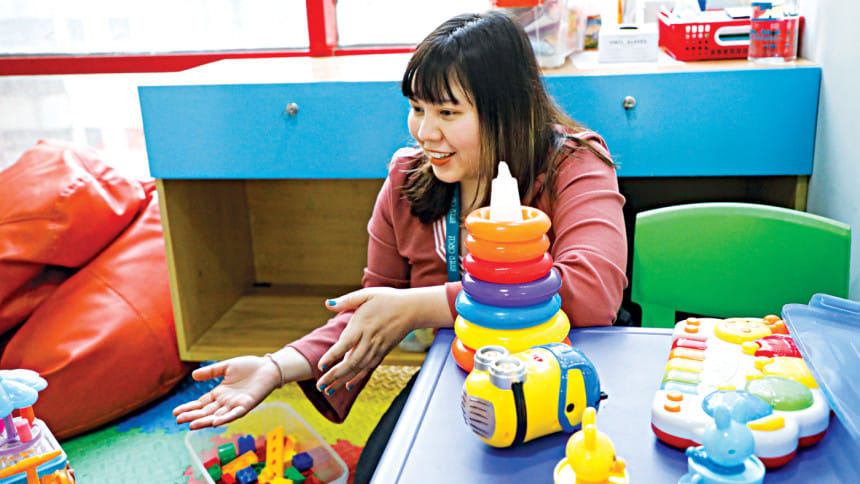Children’s mental well-being: A practice in empathy and care

The relationship between children's mental health and their overall quality of life is heavily interconnected as it influences their academic performance, interpersonal relationships, and even physical health. However, in Bangladesh, the topic of mental health, especially that of children, is treated as an afterthought, one that must be swept under the rug so as to not disrupt the societal values and norms that sit atop it in a delicate structure.
Sweeping the issue under the rug merely delays the inevitable consequences. In a survey conducted by Anchal Foundation, it was reported that a total of 364 students committed suicide from January to August of 2022. Furthermore, suicide rates ranked highest amongst primary and high school students at a whopping 53.3 per cent.
Each time a child's suicide is reported, the population discusses how preposterous it is to resort to suicide when faced with a handful of hardships. The reaction to such harrowing news eventually becomes dulled over time, intense scrutiny quickly replacing the initial shock. What should be a cause for concern and the youth's collective cry for help becomes an almost humorous topic of conversation.
Sooner or later, news of another suicide rises from the country's underbelly once more, and the cycle repeats.
To dissect the current situation, light must be shed on how the topic of mental health is still a point of great taboo and stigmatisation in the country. Even in 2023, the idea of seeking mental assistance is considered abnormal, especially for children. Simply talking about their mental struggles may earn them unfair labels and insults. The lack of awareness regarding the nuances of mental health, the causal factors for distress, and treatment procedures oftentimes silence the children completely.
Tauhid Elahi*, 14, a student of Maple Leaf International School, says, "I think I have struggled with depression and anxiety since an early age, but everyone just called me lazy and ignored it. I struggled with self-harm and I even lost a lot of weight, but my family didn't really understand what was going on. I was afraid to speak up because I thought I was exaggerating my condition and that I was just sad. Then, my elder sibling scheduled a meeting with a psychologist for me and I realised what was happening. The therapy had to be done in secret because I didn't want my parents to judge me."
The issue is echoed by Dr Tumpa Indrani Ghose, a Child and Adolescent Psychiatrist at LifeSpring, and a Registrar in the Child, Adolescent and Family Department at the National Institute of Mental Health. Institutions such as LifeSpring provide mental assistance designed for children's well-being, but some societal barriers still hinder the process.

On the topic of the stigma surrounding the mental health discourse in Bangladesh and its impact on children, Dr Tumpa Indrani Ghose says, "In my working experience, there was one young patient, aged around 8 to 9 years old, who was quite upset during the assessment session. I asked him why he was upset, and he said that his parents made him come to the session and he was scared of being bullied if anyone from his school found out. They will say that he has turned into a 'psycho' and that's why he had to go to a psychiatrist."
Dr Ghose continues, "Even the child understood that he couldn't share anything about his visit with his cousins, friends, or other peers. However, if he had gone to any other medical professional, such as a paediatrician,
he would not have thought that because there is no stigma attached to those places. In many cases, the child or adolescent patient knew that they needed mental assistance for a long time, but they could not get it due to a lack of support from family members."
The importance of familial support cannot be undermined in any capacity when it comes to the mental well-being of children, especially when caring for a child with Autism Spectrum Disorder (ASD). However, parents are also in need of proper guidance and support throughout the whole process of their child receiving therapy. Inner Circle, operating under SAJIDA Foundation, is one such organisation that opts for a holistic approach when it comes to caring for children's mental health. The organisation holds seminars for parents to become familiarised with the right approach in dealing with ASD coupled with frequent family meetings and counselling.

Thuji Grace, the Head of Special Services at Inner Circle, talks about the importance of involving parents in the treatment of children, saying, "Parental education is very important as well, as they become overly anxious about their child's diagnosis. A doctor will just give a diagnosis but what is the way forward? There must be a holistic approach to education. When it comes to ASD, early intervention is key. It takes some time for parents to properly open and accept assistance in understanding."
Apart from parents, schools also play a prominent role in the mental development of children. Educational institutions not only provide a platform for socialisation, but they also aid in early intervention in case of suspected mental health concerns of children. In spite of that, cultural barriers create obstacles, as Thuji says, "We give talks in schools where teachers share any concerns of mental health issues in students. Teachers cannot just tell the parents that they have concerns regarding specific students' mental health because of the cultural taboo. So, we talk to them and the parents, and provide instructions catered to each child."
While it is commendable what the aforementioned organisations hope to achieve, the glaring socio-economic disadvantage cannot be ignored. The accessibility of mental health services for children are often dictated by the family's financial background, as well as the social underpinnings that obstruct acceptance of seeking mental assistance.
In the case of Inner Circle, the costs are driven up due to the international standards with which the organisation operates. In such cases, the expansion for more accessibility cannot occur at the cost of quality.
Tajwar Hoque, the Head of Strategy and Partnerships at SAJIDA Foundation, says, "SAJIDA is quite well known by now for mental health interventions. Focusing on the quality and having that international experience meant that it's going to be very niche and expensive, but it also means that we would be able to build local capacities."

As for more affordable alternatives, Tajwar says, "Now that we've gained some traction in the local market, we can plan on expanding. We're coming up with some lower-cost models for different parts of Dhaka. The implementation of tech will help in early diagnoses for children since early intervention will help the child to cope better. There will also be a focus on educating parents so that they can serve some duties of the therapist at home and be aware of sensitive issues."
On the other hand, social acceptance is on the rise, as Dr Ghose says, "Currently, parents are more aware than before about children's psychology. The taboo still exists, but acceptance is being seen more and more. Parents often talk about how their child may have Obsessive Compulsive Disorder (OCD), anxiety, depression, etc. That means they have gained knowledge through watching videos, reading, and they correlate the symptoms to their children. It's not just popularity, but the treatments are being accepted as well. When they are getting a positive outcome, the patients, and their parents naturally become more compliant with the treatment."
Even though the topic of children's mental health is a collective issue, it requires individual attention for every child. While it may help to consider the narrative of children being the future of a nation, we must also remember to practise empathy on a personal level for them. Only then can we properly ensure the health and well-being of our country's youth.
*Some names of interviewees have been changed upon request for privacy.
References:
Cambridge University Press. (August 18, 2021). The current state of mental healthcare in Bangladesh.
The Dhaka Tribune. (September 9, 2022). Report: 45 students committed suicide per month in 2022.
Photo: Orchid Chakma
Fatima Jahan Ena is a sub-editor at SHOUT, The Daily Star.

 For all latest news, follow The Daily Star's Google News channel.
For all latest news, follow The Daily Star's Google News channel. 



Comments